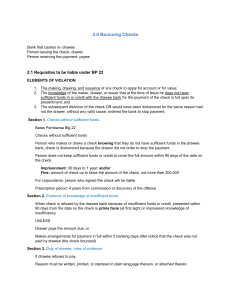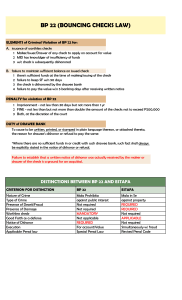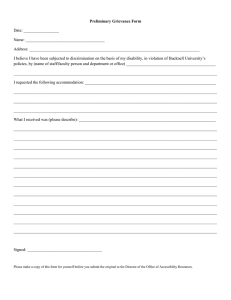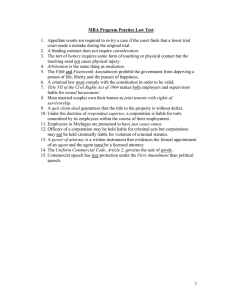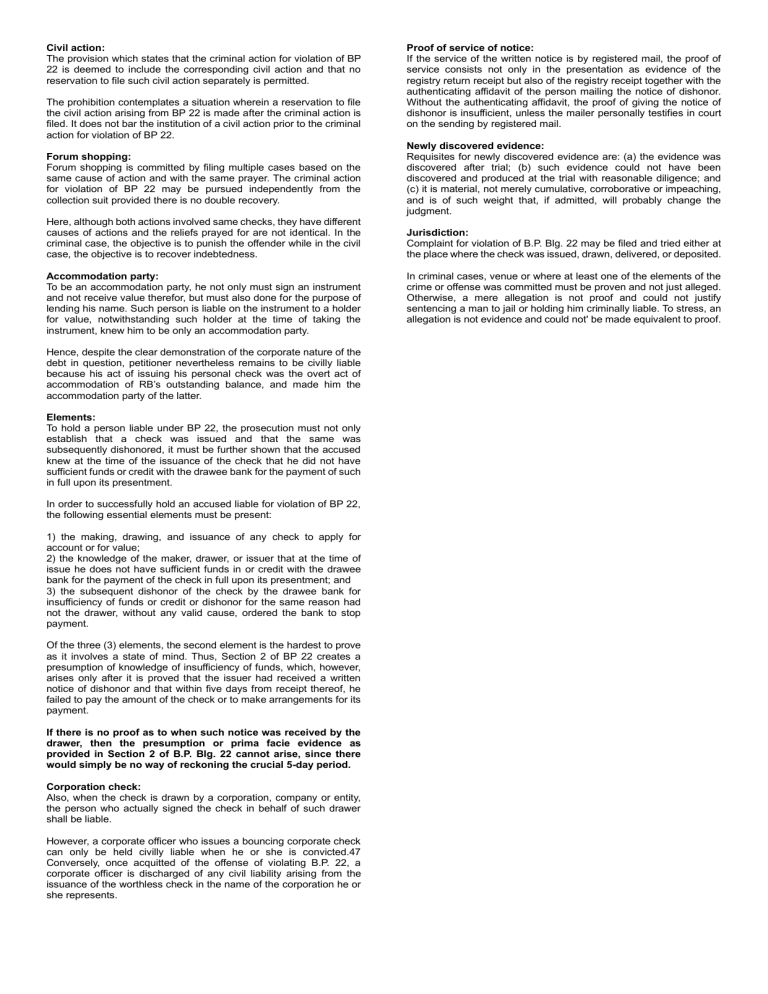
Civil action: The provision which states that the criminal action for violation of BP 22 is deemed to include the corresponding civil action and that no reservation to file such civil action separately is permitted. The prohibition contemplates a situation wherein a reservation to file the civil action arising from BP 22 is made after the criminal action is filed. It does not bar the institution of a civil action prior to the criminal action for violation of BP 22. Forum shopping: Forum shopping is committed by filing multiple cases based on the same cause of action and with the same prayer. The criminal action for violation of BP 22 may be pursued independently from the collection suit provided there is no double recovery. Here, although both actions involved same checks, they have different causes of actions and the reliefs prayed for are not identical. In the criminal case, the objective is to punish the offender while in the civil case, the objective is to recover indebtedness. Accommodation party: To be an accommodation party, he not only must sign an instrument and not receive value therefor, but must also done for the purpose of lending his name. Such person is liable on the instrument to a holder for value, notwithstanding such holder at the time of taking the instrument, knew him to be only an accommodation party. Hence, despite the clear demonstration of the corporate nature of the debt in question, petitioner nevertheless remains to be civilly liable because his act of issuing his personal check was the overt act of accommodation of RB’s outstanding balance, and made him the accommodation party of the latter. Elements: To hold a person liable under BP 22, the prosecution must not only establish that a check was issued and that the same was subsequently dishonored, it must be further shown that the accused knew at the time of the issuance of the check that he did not have sufficient funds or credit with the drawee bank for the payment of such in full upon its presentment. In order to successfully hold an accused liable for violation of BP 22, the following essential elements must be present: 1) the making, drawing, and issuance of any check to apply for account or for value; 2) the knowledge of the maker, drawer, or issuer that at the time of issue he does not have sufficient funds in or credit with the drawee bank for the payment of the check in full upon its presentment; and 3) the subsequent dishonor of the check by the drawee bank for insufficiency of funds or credit or dishonor for the same reason had not the drawer, without any valid cause, ordered the bank to stop payment. Of the three (3) elements, the second element is the hardest to prove as it involves a state of mind. Thus, Section 2 of BP 22 creates a presumption of knowledge of insufficiency of funds, which, however, arises only after it is proved that the issuer had received a written notice of dishonor and that within five days from receipt thereof, he failed to pay the amount of the check or to make arrangements for its payment. If there is no proof as to when such notice was received by the drawer, then the presumption or prima facie evidence as provided in Section 2 of B.P. Blg. 22 cannot arise, since there would simply be no way of reckoning the crucial 5-day period. Corporation check: Also, when the check is drawn by a corporation, company or entity, the person who actually signed the check in behalf of such drawer shall be liable. However, a corporate officer who issues a bouncing corporate check can only be held civilly liable when he or she is convicted.47 Conversely, once acquitted of the offense of violating B.P. 22, a corporate officer is discharged of any civil liability arising from the issuance of the worthless check in the name of the corporation he or she represents. Proof of service of notice: If the service of the written notice is by registered mail, the proof of service consists not only in the presentation as evidence of the registry return receipt but also of the registry receipt together with the authenticating affidavit of the person mailing the notice of dishonor. Without the authenticating affidavit, the proof of giving the notice of dishonor is insufficient, unless the mailer personally testifies in court on the sending by registered mail. Newly discovered evidence: Requisites for newly discovered evidence are: (a) the evidence was discovered after trial; (b) such evidence could not have been discovered and produced at the trial with reasonable diligence; and (c) it is material, not merely cumulative, corroborative or impeaching, and is of such weight that, if admitted, will probably change the judgment. Jurisdiction: Complaint for violation of B.P. Blg. 22 may be filed and tried either at the place where the check was issued, drawn, delivered, or deposited. In criminal cases, venue or where at least one of the elements of the crime or offense was committed must be proven and not just alleged. Otherwise, a mere allegation is not proof and could not justify sentencing a man to jail or holding him criminally liable. To stress, an allegation is not evidence and could not' be made equivalent to proof.
